Connect With Us
Blog
Items filtered by date: July 2024
Total Contact Casting for Diabetic Foot Ulcers
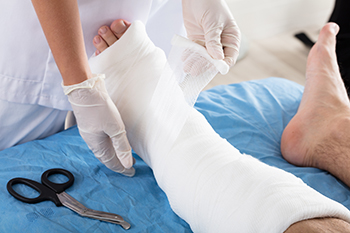
Total contact casting, or TCC, is a specialized technique used by podiatrists to treat diabetic foot ulcers by alleviating pressure on areas susceptible to skin breakdown. This method involves the application of a fiberglass or plaster cast molded to the foot's contours, which allows for even distribution of weight across the entire foot, rather than concentrating it on vulnerable spots. Total contact casting helps protect the ulcer and fosters a healing environment while allowing patients to remain mobile. It is primarily used for diabetic foot ulcers and Charcot foot, with careful monitoring required due to the potential for reduced sensation in diabetic patient's feet. Proper application includes cushioning, protective padding, and ensuring the cast is kept dry to prevent complications. The cast is typically replaced weekly until the ulcer heals sufficiently for normal footwear or orthotics. Consulting a podiatrist ensures appropriate application and monitoring of a total contact cast, preventing further complications. If you have developed diabetic foot ulcers, it is suggested that you schedule an appointment with a podiatrist to see if total contact casting is right for you.
Diabetic foot care is important in preventing foot ailments such as ulcers. If you are suffering from diabetes or have any other concerns about your feet, contact one of our podiatrists from Tri-Town Podiatry. Our doctors can provide the care you need to keep you pain-free and on your feet.
Diabetic Foot Care
Diabetes affects millions of people every year. The condition can damage blood vessels in many parts of the body, especially the feet. Because of this, taking care of your feet is essential if you have diabetes, and having a podiatrist help monitor your foot health is highly recommended.
The Importance of Caring for Your Feet
- Routinely inspect your feet for bruises or sores.
- Wear socks that fit your feet comfortably.
- Wear comfortable shoes that provide adequate support.
Patients with diabetes should have their doctor monitor their blood levels, as blood sugar levels play such a huge role in diabetic care. Monitoring these levels on a regular basis is highly advised.
It is always best to inform your healthcare professional of any concerns you may have regarding your feet, especially for diabetic patients. Early treatment and routine foot examinations are keys to maintaining proper health, especially because severe complications can arise if proper treatment is not applied.
If you have any questions please feel free to contact our offices located in Arlington, and Canton, MA . We offer the newest diagnostic and treatment technologies for all your foot and ankle needs.
Why Properly Fitted Shoes Are Important
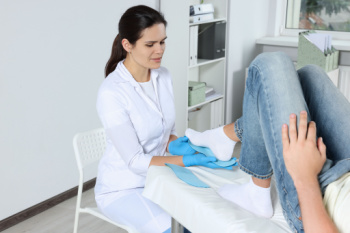 Wearing the right shoes is essential for maintaining foot health and preventing various foot problems. Ill-fitting shoes can lead to or worsen conditions such as bunions, calluses, corns, and deformities like hammer, claw, or mallet toes. These issues not only cause discomfort but can become more problematic if not addressed. Properly fitted footwear plays a significant role in relieving pain caused by foot deformities and joint problems. It also helps prevent these issues from progressing and can aid in the recovery process post-surgery. When selecting new shoes, try them on later in the day when your feet are the largest. It is important to measure both feet and choose the larger size if they differ. Shoes should have a wide, deep-toe box, a low heel, and a supportive sole. They should also allow your toes to move freely and fit snugly in the widest part of the shoe. If you have problems that may be the result of wearing ill-fitting shoes, it is suggested that you schedule an appointment with a podiatrist for an exam, diagnosis, and treatment options.
Wearing the right shoes is essential for maintaining foot health and preventing various foot problems. Ill-fitting shoes can lead to or worsen conditions such as bunions, calluses, corns, and deformities like hammer, claw, or mallet toes. These issues not only cause discomfort but can become more problematic if not addressed. Properly fitted footwear plays a significant role in relieving pain caused by foot deformities and joint problems. It also helps prevent these issues from progressing and can aid in the recovery process post-surgery. When selecting new shoes, try them on later in the day when your feet are the largest. It is important to measure both feet and choose the larger size if they differ. Shoes should have a wide, deep-toe box, a low heel, and a supportive sole. They should also allow your toes to move freely and fit snugly in the widest part of the shoe. If you have problems that may be the result of wearing ill-fitting shoes, it is suggested that you schedule an appointment with a podiatrist for an exam, diagnosis, and treatment options.
Finding a properly-fitting shoe is important in reducing injuries and preventing foot problems. For more information about treatment, contact one of our podiatrists from Tri-Town Podiatry. Our doctors will treat your foot and ankle needs.
Proper Shoe Fitting
A common concern when it comes to foot health, having properly fitted shoes can help prevent injuries to the foot. Out feet affect our posture and gait, which in turn affects the biomechanics and overall bodily structure. With 33 joints, 26 bones, and over 100 ligaments, the potential for serious injury is much greater than one realizes. Although the feet cease growth in adulthood, they still change shape as they mature. Here are some factors to consider when it comes to investing in proper fitting shoes:
- Be sure the shoes fit correctly right away
- Ensure the ball of your foot fits comfortably in the widest portion of the shoes
- Even though they may look fashionable, improper fitting shoes can either create adverse conditions or exacerbate existing ones you may already have
- Walk along a carpeted surface to ensure the shoes comfortably fit during normal activity
Keeping in mind how shoes fit the biomechanics of your body, properly-fitting shoes are vitally important. Fortunately, it is not difficult to acquire footwear that fits correctly. Be sure to wear shoes that support the overall structure of your body. Do your feet a favor and invest in several pairs of well-fitted shoes today.
If you have any questions please feel free to contact our offices located in Arlington, and Canton, MA . We offer the newest diagnostic and treatment technologies for all your foot and ankle needs.
Common Foot Injuries Suffered by Athletes
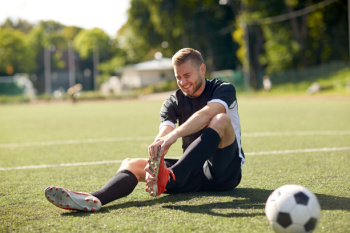
Athletes frequently encounter foot injuries due to the intense demands of their sports. Data from collegiate sports reveals significant differences in foot injury rates across various disciplines. Notably, female gymnasts and both male and female cross-country and soccer athletes show the highest rates of foot injuries. Common injuries include foot or toe contusions, midfoot injuries, plantar fascia injuries, turf toe, and metatarsal fractures. Cross-country and track and field athletes experience the highest proportions of foot injuries, with female athletes in track and field showing a higher rate of injury compared to their male counterparts. The most severe and frequent injuries identified are metatarsal fractures, plantar fascia injuries, midfoot injuries, and foot or toe bruises. Understanding these patterns is essential and vital for athletes, coaches, and medical professionals to help reduce the incidence and impact of these injuries. If you have suffered a sports related foot or ankle injury, it is suggested that you schedule an appointment with a podiatrist for a full exam and expert treatment.
Ankle and foot injuries are common among athletes and in many sports. They can be caused by several problems and may be potentially serious. If you are feeling pain or think you were injured in a sporting event or when exercising, consult with one of our podiatrists from Tri-Town Podiatry. Our doctors will assess your condition and provide you with quality foot and ankle treatment.
Common Injuries
The most common injuries that occur in sporting activities include:
- Achilles Tendonitis
- Achilles Tendon Rupture
- Ankle Sprains
- Broken Foot
- Plantar Fasciitis
- Stress Fractures
- Turf Toe
Symptoms
Symptoms vary depending upon the injury and in some cases, there may be no symptoms at all. However, in most cases, some form of symptom is experienced. Pain, aching, burning, bruising, tenderness, tightness or stiffness, sensation loss, difficulty moving, and swelling are the most common symptoms.
Treatment
Just as symptoms vary depending upon the injury, so do treatment options. A common treatment method is known as the RICE method. This method involves rest, applying ice, compression and elevating the afflicted foot or ankle. If the injury appears to be more serious, surgery might be required, such as arthroscopic or reconstructive surgery. Lastly, rehabilitation or therapy might be needed to gain full functionality in the afflicted area. Any discomfort experienced by an athlete must be evaluated by a licensed, reputable medical professional.
If you have any questions, please feel free to contact our offices located in Arlington, and Canton, MA . We offer the newest diagnostic and treatment technologies for all your foot care needs.
Why Live with Pain and Numbness in Your Feet?
Causes of Toe Pain
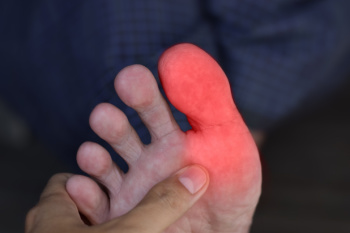 Toe pain can arise from various conditions, each requiring careful attention. Bunions, a common cause, involve a bony bump forming at the base of the big toe, leading to discomfort and swelling. Arthritis, particularly osteoarthritis and rheumatoid arthritis, can cause joint inflammation and stiffness, affecting toe movement. Infections, whether fungal or bacterial, may result in redness, swelling, and severe pain. Injuries such as fractures or sprains often lead to immediate and intense pain, impairing mobility. Peripheral artery disease, or PAD, restricts blood flow to the extremities, causing pain, especially during walking. If you have toe pain, it is suggested that you visit a podiatrist who can determine the cause and offer appropriate treatment solutions.
Toe pain can arise from various conditions, each requiring careful attention. Bunions, a common cause, involve a bony bump forming at the base of the big toe, leading to discomfort and swelling. Arthritis, particularly osteoarthritis and rheumatoid arthritis, can cause joint inflammation and stiffness, affecting toe movement. Infections, whether fungal or bacterial, may result in redness, swelling, and severe pain. Injuries such as fractures or sprains often lead to immediate and intense pain, impairing mobility. Peripheral artery disease, or PAD, restricts blood flow to the extremities, causing pain, especially during walking. If you have toe pain, it is suggested that you visit a podiatrist who can determine the cause and offer appropriate treatment solutions.
Toe pain can disrupt your daily activities. If you have any concerns, contact one of our podiatrists of Tri-Town Podiatry. Our doctors can provide the care you need to keep you pain-free and on your feet.
What Causes Toe Pain?
Most severe toe pain is caused due to a sports injury, trauma from dropping something heavy on the toe, or bumping into something rigid. Other problems can develop over time for various reasons.
Toe pain can be caused by one or more ailments. The most common include:
- Trauma
- Sports injury
- Wearing shoes that are too tight
- Arthritis
- Gout
- Corns and calluses
- Hammertoe
- Bunions
- Blisters
- Ingrown toenails
- Sprains
- Fractures (broken bones)
- Dislocations
When to See a Podiatrist
- Severe pain
- Persistent pain that lasts more than a week
- Signs of infection
- Continued swelling
- Pain that prevents walking
Diagnosis
In many cases the cause of toe pain is obvious, but in others, a podiatrist may want to use more advanced methods to determine the problem. These can range from simple visual inspections and sensation tests to X-rays and MRI scans. Prior medical history, family medical history, and any recent physical traumatic events will all be taken into consideration for a proper diagnosis.
Treatment
Treatments for toe pain and injuries vary and may include shoe inserts, padding, taping, medicines, injections, and in some cases, surgery. If you believe that you have broken a toe, please see a podiatrist as soon as possible.
If you have any questions please feel free to contact our offices located in Arlington, and Canton, MA . We offer the newest diagnostic tools and technology to treat your foot and ankle needs.
What are Pressure Ulcers on the Feet and Ankles?
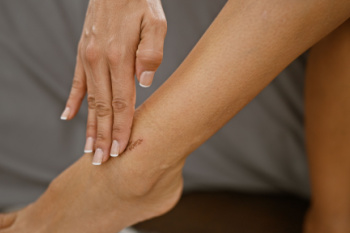 Pressure ulcers on the feet and ankles, also known as pressure sores or bedsores, are injuries to the skin and underlying tissue resulting from prolonged pressure. These ulcers are common in individuals with limited mobility, and can often affect the feet. Intrinsic factors, such as poor nutrition, age, and medical conditions like diabetes, affect the body's ability to heal and withstand pressure. Extrinsic factors involve external forces like friction and prolonged pressure from staying in one position. Symptoms include redness, pain, and open sores, which can progress to deep wounds exposing muscle and bone. Pressure ulcers occur due to reduced blood flow to the affected area, leading to tissue damage. Prevention includes regularly changing positions, using supportive devices, maintaining good nutrition, and keeping the skin clean and dry. Treatment involves relieving pressure, cleaning wounds, and using dressings or medications to promote healing. Advanced cases might require surgical intervention. If you are suffering from a pressure ulcer on your feet or ankles, it is suggested that you schedule an appointment with a podiatrist as soon as possible for care.
Pressure ulcers on the feet and ankles, also known as pressure sores or bedsores, are injuries to the skin and underlying tissue resulting from prolonged pressure. These ulcers are common in individuals with limited mobility, and can often affect the feet. Intrinsic factors, such as poor nutrition, age, and medical conditions like diabetes, affect the body's ability to heal and withstand pressure. Extrinsic factors involve external forces like friction and prolonged pressure from staying in one position. Symptoms include redness, pain, and open sores, which can progress to deep wounds exposing muscle and bone. Pressure ulcers occur due to reduced blood flow to the affected area, leading to tissue damage. Prevention includes regularly changing positions, using supportive devices, maintaining good nutrition, and keeping the skin clean and dry. Treatment involves relieving pressure, cleaning wounds, and using dressings or medications to promote healing. Advanced cases might require surgical intervention. If you are suffering from a pressure ulcer on your feet or ankles, it is suggested that you schedule an appointment with a podiatrist as soon as possible for care.
Wound care is an important part in dealing with diabetes. If you have diabetes and a foot wound or would like more information about wound care for diabetics, consult with one of our podiatrists from Tri-Town Podiatry. Our doctors will assess your condition and provide you with quality foot and ankle treatment.
What Is Wound Care?
Wound care is the practice of taking proper care of a wound. This can range from the smallest to the largest of wounds. While everyone can benefit from proper wound care, it is much more important for diabetics. Diabetics often suffer from poor blood circulation which causes wounds to heal much slower than they would in a non-diabetic.
What Is the Importance of Wound Care?
While it may not seem apparent with small ulcers on the foot, for diabetics, any size ulcer can become infected. Diabetics often also suffer from neuropathy, or nerve loss. This means they might not even feel when they have an ulcer on their foot. If the wound becomes severely infected, amputation may be necessary. Therefore, it is of the upmost importance to properly care for any and all foot wounds.
How to Care for Wounds
The best way to care for foot wounds is to prevent them. For diabetics, this means daily inspections of the feet for any signs of abnormalities or ulcers. It is also recommended to see a podiatrist several times a year for a foot inspection. If you do have an ulcer, run the wound under water to clear dirt from the wound; then apply antibiotic ointment to the wound and cover with a bandage. Bandages should be changed daily and keeping pressure off the wound is smart. It is advised to see a podiatrist, who can keep an eye on it.
If you have any questions, please feel free to contact our offices located in Arlington, and Canton, MA . We offer the newest diagnostic and treatment technologies for all your foot care needs.
Blog Archives
- March 2025
- February 2025
- January 2025
- December 2024
- November 2024
- October 2024
- September 2024
- August 2024
- July 2024
- June 2024
- May 2024
- April 2024
- March 2024
- February 2024
- January 2024
- December 2023
- November 2023
- October 2023
- September 2023
- August 2023
- July 2023
- June 2023
- May 2023
- April 2023
- March 2023
- February 2023
- January 2023
- December 2022
- November 2022
- October 2022
- September 2022
- August 2022
- July 2022
- June 2022
- May 2022
- April 2022
- March 2022
- February 2022
- January 2022
- December 2021
- November 2021

